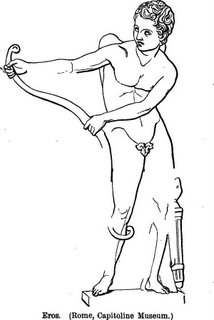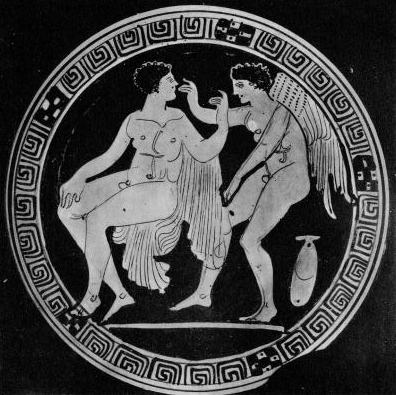Redefining Έρος
 To be honest, I don’t need another reason to dislike the pope, but his ignorant misuse of the Greek concept of έρος (eros) in his first encyclical, Deus Caritas Est (“God is Love”), has me really pissed off.
To be honest, I don’t need another reason to dislike the pope, but his ignorant misuse of the Greek concept of έρος (eros) in his first encyclical, Deus Caritas Est (“God is Love”), has me really pissed off.“That love between man and woman which is neither planned nor willed, but somehow imposes itself upon human beings, was called eros by the ancient Greeks.”
Ratzinger thinks he’s being all hip by embracing έρος rather than rejecting it like some of his more prudish predecessors did. But he can embrace έρος only by radically redefining it. I mean, does it really need to be said at this point that έρος for the Greeks described sexual (i.e. erotic) love between men and youths as much (if not more) than love between men and women? Despite our society’s lingering squeamishness surrounding homosexuality, we’re not in the 19th century anymore, and nobody—not even the pope—can feign ignorance of the fact that in ancient Greece έρος caused men to have sex with youths.
In Charmides (154c), for example, Plato describes έρος as the love of men for youths that often blossoms in the testosterone-filled changing room of the gymnasium:
“I marveled at his stature and beauty, and I felt everyone else in the room was in love with him; they were thrown into such amazement and confusion when he came in, and there were many other suitors following after him too.”Likewise in Phaedrus (255a-d), Plato invokes έρος to describe the process by which a wooed youth succumbs to his suitor and falls in love with him. Once again, the gymnasium is referenced as one of the settings in which the drama of έρος unfolds:
“τότε εκείνος εμοί θαυμαστός εφάνη τό τε μέγεθος καί το κάλλος, οι δε δη άλλοι πάντες εράν έμοιγε εδόκουν αυτού—ούτως εκπεπληγμένοι τε καί τεθορυβημένοι ήσαν, ήνίκ’ εισήει—πολλοί δε δη άλλοι ερασταί καί εν τοις όπισθεν είποντο.”
“Now the beloved, since he receives all service from his lover, as if he were a god, and since the lover is not feigning, but is really in love, and since the beloved himself is by nature friendly to him who serves him, although he may at some earlier time have been prejudiced by his schoolfellows or others, who said that it was a disgrace to yield to a lover, and may for that reason have repulsed his lover, yet, as time goes on, his youth and destiny cause him to admit him to his company… And when the lover is thus admitted, and the privilege of conversation and intimacy has been granted him, his good will, as it shows itself in close intimacy, astonishes the beloved, who discovers that the friendship of all his other friends and relatives is as nothing when compared with that of his inspired lover.
And as this intimacy continues and the lover comes near and touches the beloved in the gymnasia and in their general intercourse, then the fountain of that stream which Zeus, when he was in love with Ganymede, called ‘desire’ flows copiously upon the lover; and some of it flows into him, and some, when he is filled, overflows outside; and just as the wind or an echo rebounds from smooth, hard surfaces and returns whence it came, so the stream of beauty passes back into the beautiful one through the eyes, the natural inlet to the soul, where it reanimates the passages of the feathers, waters them and makes the feathers begin to grow, filling the soul of the loved one with love. So he is in love, but he knows not with whom; he does not understand his own condition and cannot explain it.”
“άτε ουν πάσαν θεραπείαν ως ισόθεος θεραπευόμενος ουχ υπό σχηματιζομένου του ερώντος αλλ’ αληθώς τούτο πεπονθότος, καί αυτός ων φύσει φίλος τω θεραπεύοντι, έαν άρα καί εν τω πρόσθεν υπό συμφοιτητών ή τινων άλλων διαβεβλημένος ή, λεγόντων ως αισχρόν ερώντι πλησιάζειν, καί διά τούτο απωθή τον ερώντα, προϊόντος δε ήδη του χρόνου ή τε ηλικία καί το χρέων ήγαγεν εις το προσέσθαι αυτόν εις ομιλίαν… προσεμένου δε καί λόγον καί ομιλίαν δεξαμένου, εγγύθεν η εύνοια γιγνομένη του ερώντος εκπλήττει τον ερώμενον διαισθανόμενον ότι ουδ’ οι σύμπαντες άλλοι φίλοι τε και οικείοι μοίραν φιλίας ουδεμίαν παρέχονται προς τον ένθεον φίλον.
όταν δε χρονίζη τούτο δρών καί πλησιάζη μετά του άπτεσθαι εν τε γυμνασίοις καί εν ταις άλλαις ομιλίαις, τότ’ ήδη η του ρεύματος εκείνου πηγή, όν ίμερον Ζευς Γανυμήδους έρων ωνόμασε, πολλή φερομένη προς τον εραστήν, ή μεν εις αυτόν έδυ, ή δ’ απομεστουμένου έξω απορρεί: καί οιον πνεύμα ή τις ηχώ από λείων τε καί στερεών αλλομένη πάλιν όθεν ωρμήθη φέρεται, ούτω το του κάλλους ρεύμα πάλιν εις τον καλόν διά των ομμάτων ιόν, ή πέφυκεν επι την ψυχήν ιέναι αφικόμενον καί αναπτερώσαν, τας διόδους των πτερών άρδει τε καί ώρμησε πτεροφυείν τε καί την του ερωμένου αυ ψυχήν έρωτος ενέπλησεν. ερά μεν ουν, ότου δε απορεί: καί ουθ’ ότι πέπονθεν οίδεν ουδ’ έχει φράσαι.”
One historian of the ancient world summarized the situation by declaring:
“Eros presided primarily over the passionate devotion of a grown man to a boy [i.e. youth]; Aphrodite over the sexual relations between man and woman” (Robert Flacelière, Love in Ancient Greece, 1962).
I am struck by the hubris of one so hostile to same-sex love making use of the concept of έρος. Moreover, Ratzinger cannot use έρος without changing its meaning. Έρος, as defined by the Greeks, is not really a helpful concept for him at all. As a result, he has to alter it, clean it up. Ironically, he asks in his encyclical, “Did Christianity really destroy eros?” By invoking the concept of έρος while simultaneously stripping it of its same-sex connotations, he comes close to doing just that. Perhaps, it would be better if he left έρος out of his equation altogether.
 The above image shows Eros with a seated youth (400 – 300 BCE, Athenian Red-Figure Cup, Kunsthistorisches Museum, Vienna).
The above image shows Eros with a seated youth (400 – 300 BCE, Athenian Red-Figure Cup, Kunsthistorisches Museum, Vienna).












0 Comments:
Post a Comment
<< Home